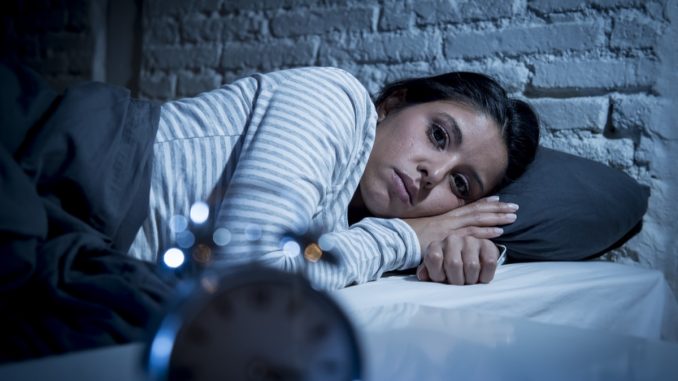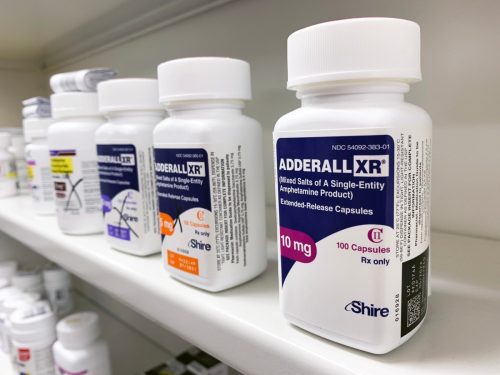Advertisement

Anyone who has cared for a toddler, pulled through a late-night study session, or worked the graveyard shift knows the importance of a good night’s sleep. Getting the recommended seven to nine hours of sleep a night is not only important for feeling rested, but also for mood, cardiovascular health, brain function, immunity, and appetite. Unfortunately, sleep disorders are on the rise. According to the American Sleep Apnea Association, sleep-related problems affect 50 to 70 million Americans of all ages and socioeconomic classes. The causes of our collective sleep deprivation are numerous, but one reason could be lurking in your medicine cabinet. Read on to find out which popular medications might be affecting your sleep, according to one doctor.
READ THIS NEXT: 5 Signs Your Sleeping Pills Are Hurting You, Doctors Warn.

Antidepressants are among the most commonly prescribed medications due to their effectiveness in treating depression. One of the most popular antidepressants, serotonin reuptake inhibitors (SSRIs), work to combat depression and anxiety by regulating serotonin, which is known as a brain chemical. Unfortunately, although antidepressants like SSRIs work medical wonders and help save lives, they can negatively impact your sleep quality and even cause insomnia.
“Antidepressants can keep you up at night. While it may seem counterintuitive, it’s common for antidepressants to cause insomnia,” he says Laura Purdy, MD, MBA and board-certified general practitioner in Fort Benning, Georgia. “In some people it can be solved by taking it in the morning rather than at bedtime or maybe lowering the dose.”

These drugs are commonly prescribed to treat children, teens, and adults who have been diagnosed with Attention Deficit Hyperactivity Disorder (ADHD). Popular ADHD medications include Ritalin and Adderall, two stimulants that can cause insomnia and trouble sleeping. In a 2021 study published in Frontiers in PsychiatryResearchers examined the link between ADHD and insomnia and found that nearly 45 percent of adult ADHD sufferers experienced insomnia related to ADHD medication.
“Many people with ADHD prefer to take shorter-acting stimulants or take them earlier in the day. That way, the drug has time to wear off before bedtime,” explains Purdy. “Ritalin and Adderall are stimulant medications that cause you to have trouble falling and staying asleep.”

If you’ve ever dealt with seasonal allergies, then you’ve probably used (or at least heard of) Benadryl. Benadryl is an over-the-counter brand name for an antihistamine called diphenhydramine. Diphenhydramine is used to relieve symptoms associated with allergies, hay fever, and colds, including itchy, watery eyes, sneezing, coughing, and runny nose.
Although diphenhydramine and other histamines tend to make you sleepy and sedative, they do not improve sleep quality. Benadryl can have the opposite effect and cause insomnia. In addition, this popular drug can even lead to hyperactivity, especially in children. Purdy explains, “Some people have an idiopathic response, which means that instead of becoming tired or sedated, they become more alert and alert and have trouble sleeping. Children are particularly susceptible to this.”
Sign up for our daily newsletter to get more health news delivered straight to your inbox.

Oral steroids are anti-inflammatory drugs that typically come in tablet form. These drugs treat various conditions, including allergies, asthma, eczema, inflammatory bowel disease, and arthritis. While steroids are incredible for solving many uncomfortable and painful ailments, they can seriously disrupt your sleep. According to a 2021 study published in , sleep problems, psychosis, and delirium are commonly reported adverse effects of corticosteroids (a common steroid). federal practitioner.
“Steroids often cause insomnia when taken orally. However, most people don’t take steroids for a long time, and the side effects of the steroids go away when the person stops taking them,” says Purdy.
Best Life provides the most up-to-date information from top experts, emerging research and public health authorities, but our content is not intended as a substitute for professional advice. When it comes to taking medication or other health-related questions, always consult your doctor directly.

